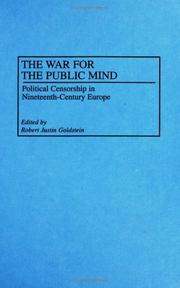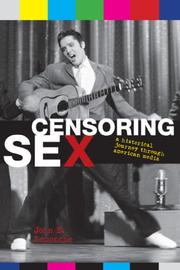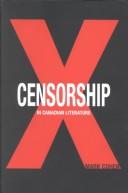| Listing 1 - 10 of 66 | << page >> |
Sort by
|
Book
ISBN: 1472503007 1780934025 147250299X 9781472502995 9781849668927 1849668922 9781472503008 9781780934020 9781472523259 1472523253 9781472558534 1472558537 Year: 2012 Publisher: London Bristol Classical Press
Abstract | Keywords | Export | Availability | Bookmark
 Loading...
Loading...Choose an application
- Reference Manager
- EndNote
- RefWorks (Direct export to RefWorks)
"In the first collection to be devoted to this subject, a distinguished cast of contributors explores expurgation in both Greek and Latin authors in ancient and modern times. The major focus is on the period from the seventeenth to the twentieth century, with chapters ranging from early Greek lyric and Aristophanes through Lucretius, Horace, Martial and Catullus to the expurgation of schoolboy texts, the Loeb Classical Library and the Penguin Classics. The contributors draw on evidence from the papers of editors, and on material in publishing archives. The introduction discusses both the different types of expurgation, and how it differs from related phenomena such as censorship."--Bloomsbury Publishing In the first collection to be devoted to this subject, a distinguished cast of contributors explores expurgation in both Greek and Latin authors in ancient and modern times. The major focus is on the period from the seventeenth to the twentieth century, with chapters ranging from early Greek lyric and Aristophanes through Lucretius, Horace, Martial and Catullus to the expurgation of schoolboy texts, the Loeb Classical Library and the Penguin Classics. The contributors draw on evidence from the papers of editors, and on material in publishing archives. The introduction discusses both the different types of expurgation, and how it differs from related phenomena such as censorship
Classical literature --- Expurgated books. --- Books, Expurgated --- Books and reading --- Censorship --- Printing --- History and criticism --- Theory, etc. --- Cancels --- History and criticism.
Book
ISBN: 1282539795 9786612539794 0253003954 9780253003959 9781282539792 6612539798 9780253353351 0253353351 9780253220936 0253220939 Year: 2009 Publisher: Bloomington : Indiana University Press,
Abstract | Keywords | Export | Availability | Bookmark
 Loading...
Loading...Choose an application
- Reference Manager
- EndNote
- RefWorks (Direct export to RefWorks)
Censorship in South Asia offers an expansive and comparative exploration of cultural regulation in contemporary and colonial South Asia. These provocative essays by leading scholars broaden our understanding of what censorship might mean -- beyond the simple restriction and silencing of public communication -- by considering censorship's productive potential and its intimate relation to its apparent opposite, "publicity." The contributors investigate a wide range of public cultural phenomena, from the cinema to advertising, from street politics to political communication, and from the adjudication of blasphemy to the management of obscenity.
Censorship --- Book censorship --- Books --- Literature --- Literature and morals --- Anticensorship activists --- Challenged books --- Expurgated books --- Intellectual freedom --- Prohibited books --- Law and legislation --- Censure
Book
ISBN: 1443869139 9781443869133 1443860581 1322216096 9781443860581 Year: 2014 Publisher: Newcastle upon Tyne Cambridge Scholars Publishing
Abstract | Keywords | Export | Availability | Bookmark
 Loading...
Loading...Choose an application
- Reference Manager
- EndNote
- RefWorks (Direct export to RefWorks)
Enforcing and Eluding Censorship: British and Anglo-Italian Perspectives brings together a wide range of current work on literary, cultural and linguistic censorship by a team of fifteen contributors working in Italy, Britain and continental Europe. Censorship can take hold of a written text before or after its public appearance; it can strike the cultural item, as well as the very individual/s who created it; it can also catch in its net the agents responsible for its publication and diffus...
Censorship --- Book censorship --- Books --- Literature --- Literature and morals --- Anticensorship activists --- Challenged books --- Expurgated books --- Intellectual freedom --- Prohibited books --- History. --- Law and legislation --- History --- E-books
Book
ISBN: 1316722600 1316723208 1316723801 1316724409 1316726207 1316443752 1107132045 1107583446 1316719006 9781316724408 9781316443750 9781316726204 9781107583443 9781107132047 9781107583443 Year: 2016 Publisher: New York : Cambridge University Press,
Abstract | Keywords | Export | Availability | Bookmark
 Loading...
Loading...Choose an application
- Reference Manager
- EndNote
- RefWorks (Direct export to RefWorks)
Convinced that sexual immorality and unstable gender norms were endangering national recovery after World War One, German lawmakers drafted a constitution in 1919 legalizing the censorship of movies and pulp fiction, and prioritizing social rights over individual rights. These provisions enabled legislations to adopt two national censorship laws intended to regulate the movie industry and retail trade in pulp fiction. Both laws had their ideological origins in grass-roots anti-'trash' campaigns inspired by early encounters with commercial mass culture and Germany's federalist structure. Before the war, activists characterized censorship as a form of youth protection. Afterwards, they described it as a form of social welfare. Local activists and authorities enforcing the decisions of federal censors made censorship familiar and respectable even as these laws became a lightning rod for criticism of the young republic. Nazi leaders subsequently refashioned anti-'trash' rhetoric to justify the stringent censorship regime they imposed on Germany.
Censorship --- Nationalism --- Book censorship --- Books --- Literature --- Literature and morals --- Anticensorship activists --- Challenged books --- Expurgated books --- Intellectual freedom --- Prohibited books --- History --- Law and legislation --- Germany

ISBN: 0275964612 9780275964610 0313001219 9780313001215 9798216033615 Year: 2000 Publisher: Westport (Conn.), London : Praeger,
Abstract | Keywords | Export | Availability | Bookmark
 Loading...
Loading...Choose an application
- Reference Manager
- EndNote
- RefWorks (Direct export to RefWorks)
Presenting a comprehensive discussion of the censorship of books, newspapers, carricutures, theatre and film, this volume provides an analytical introductory survey and six chapters that summarize the 19th-century censorship practices in the six major countries of continental Europe.
Censorship --- Communication in politics --- Political communication --- Political science --- Book censorship --- Books --- Literature --- Literature and morals --- Anticensorship activists --- Challenged books --- Expurgated books --- Intellectual freedom --- Prohibited books --- History --- Law and legislation --- Europe --- Politics and government --- CENSURE --- HISTOIRE --- 19E-20E SIECLES

ISBN: 0742551318 9780742551312 0742572757 9780742572751 129978884X 9781299788848 9780742551329 0742551326 Year: 2007 Publisher: Lanham : Rowman & Littlefield,
Abstract | Keywords | Export | Availability | Bookmark
 Loading...
Loading...Choose an application
- Reference Manager
- EndNote
- RefWorks (Direct export to RefWorks)
In this gracefully written, accessible and entertaining volume, John Semonche surveys censorship for reasons of sex from the nineteenth century up until the present. He covers the various forms of American media-books and periodicals, pictorial art, motion pictures, music and dance, and radio, television, and the Internet. Despite the varieties of censorship, running from self-censorship to government bans, a common story is told. In each of the areas, Semonche explains via abundant examples how and why censorship took place. He also details how the cultural territory contested by those advoca
Censorship --- Sex in popular culture --- History. --- Book censorship --- Books --- Literature --- Law and legislation --- Literature and morals --- Anticensorship activists --- Challenged books --- Expurgated books --- Intellectual freedom --- Prohibited books --- United States --- History
Book
ISBN: 9789004304345 9004304355 9789004304352 9004304347 Year: 2016 Publisher: Leiden Brill/Martinus Nijhoff
Abstract | Keywords | Export | Availability | Bookmark
 Loading...
Loading...Choose an application
- Reference Manager
- EndNote
- RefWorks (Direct export to RefWorks)
María José Falcón y Tella invites us on a fascinating journey through the world of law and literature, travelling through the different eras and exploring eternal and as such current issues such as justice, power, resistance, vengeance, rights, and duties. This is an unending conversation, which brings us back to Sophocles and Dickens, Cervantes and Kafka, Dostoyevsky and Melville, among many others. There are many ways to approach the concept of “Law and Literature”. In the classical manner, the author distinguishes three paths: the Law of Literature, involving a technical approach to the literary theme; Law as Literature, a hermeneutical and rhetorical approach to examining legal texts; and finally, Law in Literature, which is undoubtedly the most fertile and documented perspective (the fundamental part of the work focusses on this direction). This timely volume offers an introduction to this enormous field of study, which was born in the United States over a century ago and is currently taking root in the European continent.
Law and literature. --- Law in literature. --- Intellectual property in literature. --- Censorship. --- Book censorship --- Books --- Censorship --- Literature --- Literature and morals --- Anticensorship activists --- Challenged books --- Expurgated books --- Intellectual freedom --- Prohibited books --- Literature and law --- Law and legislation

ISBN: 1282859439 9786612859434 0773569375 9780773569379 9781282859432 077352214X 9780773522145 6612859431 Year: 2001 Publisher: Montreal Ithaca McGill-Queen's University Press
Abstract | Keywords | Export | Availability | Bookmark
 Loading...
Loading...Choose an application
- Reference Manager
- EndNote
- RefWorks (Direct export to RefWorks)
Cohen critiques Timothy Findley's broad anti-censorship position; he traces Margaret Atwood's evolution from implicit support for the censorship of pornography in Bodily Harm to the rejection of censorship in The Handmaid's Tale; and he provides the first detailed study of the draft of Margaret Laurence's unfinished novel, showing the degree to which her final silence was a result of her censorship ordeal. Finally, an analysis of the writing of Beatrice Culleton and Marlene Nourbese Philip shows how different kinds of socio-cultural censorship - from gate-keepers to self-censorship - silence Native and black Canadian voices. Cohen's re-definition of censorship as essentially a practice of judgment takes us beyond the traditional Enlightenment delineation of censorship as an oppressive government practice and the consequent neutralist liberal condemnation of censorship on principle. Since judgment is enmeshed in the fabric of human endeavour, censorship is inevitable; since censorship is inevitable, Cohen concludes, debate over whether censorship itself is desirable should give way to a search for censorship practices that are more just. Censorship in Canadian Literature is an essential text for scholars of Canadian literature as well as for anyone concerned with contemporary debates about censorship and civil rights.
Censorship --- Censorship in literature. --- Book censorship --- Books --- Literature --- Literature and morals --- Anticensorship activists --- Challenged books --- Expurgated books --- Intellectual freedom --- Prohibited books --- Law and legislation --- Canadian fiction --- History and criticism.
Book
ISBN: 1618115022 9781618115027 1618115014 9781618115010 1618115448 Year: 2016 Publisher: Boston
Abstract | Keywords | Export | Availability | Bookmark
 Loading...
Loading...Choose an application
- Reference Manager
- EndNote
- RefWorks (Direct export to RefWorks)
Captivated at a young age by Russia, Marianna Tax Choldin immersed herself as a student at the University of Chicago in that country's language and culture. In her book she describes the tension between her strong commitment to freedom of expression and her growing understanding of Russian and Soviet censorship. Fluent in Russian, she travels widely in post-Soviet Russia, speaking with hundreds of Russians about their own censorship history. She writes of the close friendships she formed in Russia, and reflects on her Jewish roots in the country her family had left behind 100 years earlier.
Censorship --- Book censorship --- Books --- Literature --- Literature and morals --- Anticensorship activists --- Challenged books --- Expurgated books --- Intellectual freedom --- Prohibited books --- History --- Law and legislation --- Choldin, Marianna Tax --- Travel --- Choldin, Marianna T.
Book
ISBN: 9781628920093 1628920092 9781628920116 1628920114 9781628920109 9781501304613 1501304615 1628920106 9781628920109 Year: 2015 Publisher: London [etc.] Bloomsbury Academic
Abstract | Keywords | Export | Availability | Bookmark
 Loading...
Loading...Choose an application
- Reference Manager
- EndNote
- RefWorks (Direct export to RefWorks)
"Though literature and censorship have been conceived as long-time adversaries, this collection seeks to understand the degree to which they have been dialectical terms, each producing the other, coeval and mutually constitutive. On the one hand, literary censorship has been posited as not only inescapable but definitive, even foundational to speech itself. On the other, especially after the opening of the USSR's spekstrahn, those enormous collections of literature forbidden under the Soviets, the push to redefine censorship expansively has encountered cogent criticism. Scholars describing the centralised control of East German print publication, for example, have wanted to insist on the difference of pre-publication state censorship from more mundane forms of speech regulation in democracies. Work on South African apartheid censorship and book banning in colonial countries also demonstrates censorship's formative role in the institutional structures of literature beyond the metropole. Censorship and the Limits of the Literary examines these and other developments across twelve countries, from the Enlightenment to the present day, offering case studies from the French revolution to Internet China. Is literature ever without censorship? Does censorship need the literary? In a globalizing era for culture, does censorship represent the final (failed) version of national control?"--
Censorship --- Literature, Modern --- Literature and state. --- Censure --- Littérature moderne --- Littérature --- History. --- Case studies --- History and criticism. --- Histoire --- Etudes de cas --- Histoire et critique --- Politique gouvernementale --- Littérature moderne --- Littérature --- State and literature --- Authors and patrons --- Cultural policy --- Book censorship --- Books --- Literature --- Literature and morals --- Anticensorship activists --- Challenged books --- Expurgated books --- Intellectual freedom --- Prohibited books --- Law and legislation
| Listing 1 - 10 of 66 | << page >> |
Sort by
|

 Search
Search Feedback
Feedback About UniCat
About UniCat  Help
Help News
News